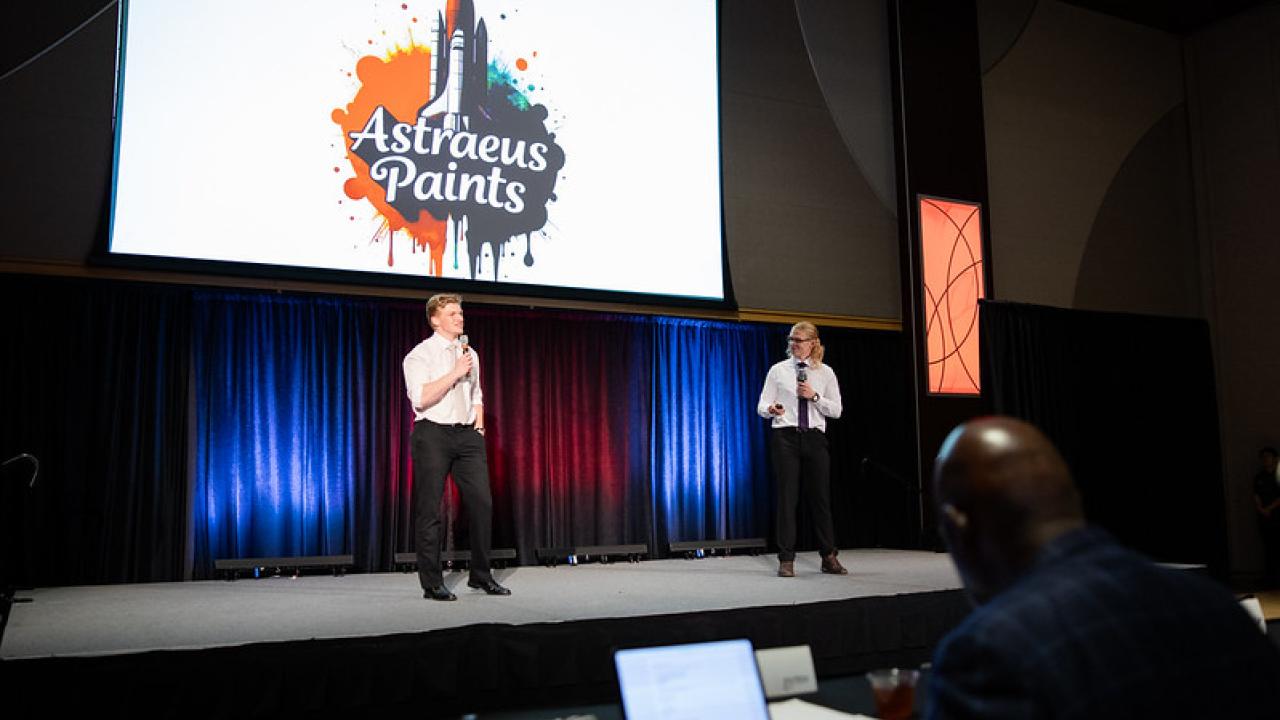This year’s President’s Buckeye Accelerator came with an unexpected twist: three of the six winning ventures were led by sibling teams.
Each pair brought a combination of technical expertise, business insight and years of built-in trust to the program. All three teams earned $50,000 in startup funding, along with mentorship and resources to help take their ideas to the next level.
Zachary and Isaac Smith grew up in Waynesburg, Ohio, a small rural town south of Canton. Zachary, an aerospace engineering student at The Ohio State University, has been fascinated by space since childhood. Isaac, a first-year business management student at Malone University, started building businesses in high school. When Zachary came across an email about the Boss Space competition, he immediately thought to bring Isaac in.
“I could handle the space side, and Isaac had the business experience,” Zachary said. “It was kind of the perfect match.”
The brothers developed a color-changing paint that alerts users to the presence of dangerous space radiation. The idea was inspired by NASA’s published list of top space hazards. After winning the Boss Space competition, the brothers joined the President’s Buckeye Accelerator to continue developing the product for real-world use.
In Cincinnati, brothers Colin and Jonah Mikesell were already running a venture of their own. Colin, a fourth-year electrical engineering student, founded Phoenix Battery Company to repurpose used electric vehicle batteries that still have useful life. Jonah, a first-year environmental science major, joined the team to lead sustainability efforts.
“We’ve been selling portable chargers for a few years now,” Jonah said. “But with the Accelerator, we’ve been able to refine the product, lock in certifications and get ready to scale.”
“There’s a lot of value left in these batteries when they’re done being used in vehicles,” Colin added. “We don’t think it’s appropriate to prematurely recycle them. They still have a lot of life left.”
The brothers are finalizing federal safety certifications and plan to launch a line of handheld power banks and power stations. While Colin prepares to graduate, Jonah will continue running day-to-day operations in Columbus.
SPAERO Systems, another winning venture, is focused on improving sanitation in spacecraft. The company was founded by Ian Harris, a doctoral student at Ohio State, and his brother Nikolas, a first-year student majoring in culinary entrepreneurship. Their invention, SWAN, is a handheld sterilization device that uses ambient air and electricity to eliminate mold and bacteria on surfaces—without relying on disposable wipes or chemical cleaners.
Their idea gained traction during the Boss Space Ventures program, where feedback from NASA microbiologists helped validate their approach. Current space cleaning protocols rely on single-use materials, which create waste and logistical challenges for long-duration missions.
“The validation we got through that process was huge,” Ian said. “It confirmed that we weren’t just solving a problem on paper. This is a real need.”
“One researcher told us that 20 years ago, they would’ve laughed at the idea,” Nikolas said. “But now, they’re saying this is exactly what’s needed.”
While the ventures cover different industries—materials science, energy and sanitation—all three sibling teams credited their success to a shared foundation of trust and complementary strengths. The President’s Buckeye Accelerator provided the structure and support, but for these students, collaboration started long before college.
“It’s rare to get this kind of opportunity,” Nikolas said. “To build something meaningful—and to do it with your brother—it’s something we’ll never forget.”
The President’s Buckeye Accelerator is designed to help student ventures move from concept to company. This year, it also demonstrated the power of family in turning big ideas into bold action.
